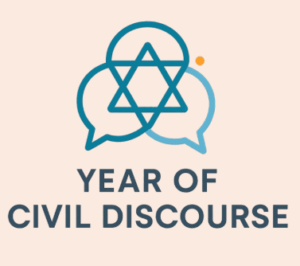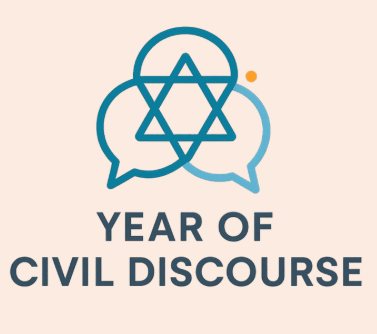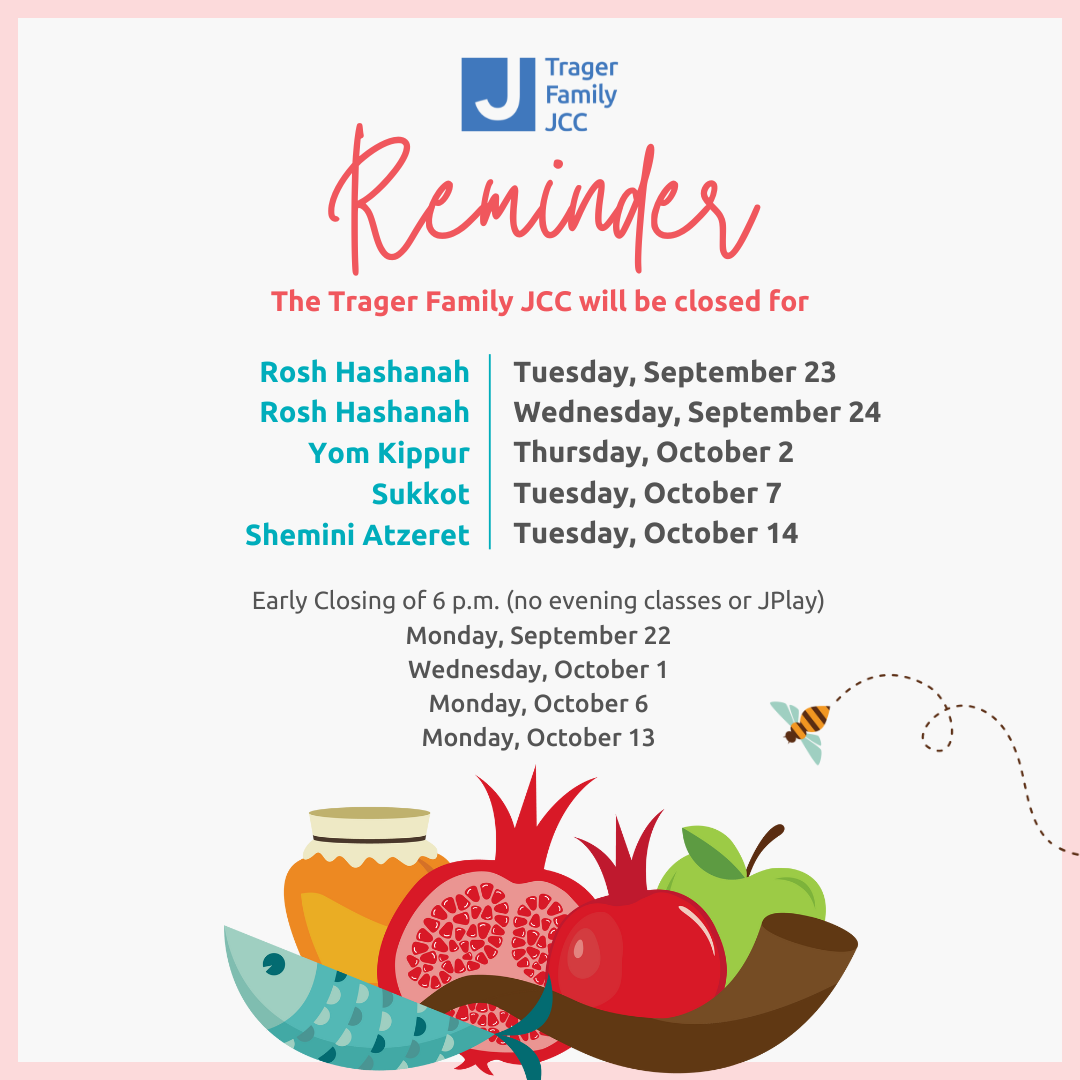By Andrew Adler
Community Editor
 It is no exaggeration to say that American Jews have seldom, if ever, been more ideologically polarized than they are today – especially when the subject is Israel.
It is no exaggeration to say that American Jews have seldom, if ever, been more ideologically polarized than they are today – especially when the subject is Israel.
“We’re probably at the most fraught time as a Jewish community since the end of the Holocaust,” says Trent Spoolstra, director of the Jewish Community Relations Council at the Jewish Federation of Louisville. Rising antisemitism and political upheaval, set against the backdrop of the Gaza war and its concurrent humanitarian crisis, have often transformed reasoned debate into angry, rancorous confrontation.
Determined to address these and similar challenges within Louisville, the JCRC, Jewish Family & Career Services and a consortium of like-minded allies, are spearheading what’s called the Year of Civil Discourse. In a multilayered, deliberately coolheaded process whose planning began over a year ago, the project will seek new strategies aimed at giving voice to competing perspectives on Jewish identity and post-October 7th Israel – while acknowledging the diversity of viewpoints within the Jewish community.
Beginning in November, a core group of local community members and Jewish professionals will be trained in those strategies, after which selected participants will reach out to include broader segments of the community. There will be particular emphasis on connecting with younger Jewish Louisvillians who aren’t affiliated with synagogues or other Jewish communal organizations, and who may be seeking new paths toward embracing their Jewish identity.
This initiative grew out of talks between Marilyn Schorin – a highly respected Louisville consultant and strategist – and leaders from The Temple and JFCS. Schorin had emailed leaders of those two organizations, proposing that they consider an alternative approach for the community to address potentially contentious issues of pressing importance.
Around the same time, JCRC was undergoing a restructuring that put greater emphasis on a smaller, more flexible subset of the main board. This executive board “was nimbler” and thus better able “to respond to the issues that were coming our way,” JCRC chair Bill Altman said.
The idea, Altman outlined, was to stock the executive board with “people with divergent views around difficult issues in our community.” Meanwhile, JFCS and The Temple were continuing to think of how best to encourage what Altman described as “difficult conversations and remaining connected as a community, even in the face of disagreement.”
“When, collectively, we learned about these parallel projects,” he said, “the two groups came together and the “Year of Civil Discourse was born.”
Altman and his JCRC colleagues sought a norm of “being willing to listen to different views – not to convince people of our side, our views, but to increase understanding of the complexity of these issues,” he said. “And ultimately, to reaffirm our Jewish identity.”
“The Year of Civil Discourse” is largely modeled after a project by the same name hatched 15 years ago by JCRC Bay Area, which serves San Francisco and nine nearby counties. Begun in December 2010, it ran through most of 2011.
“We reached out to a prominent, now retired rabbi (Rabbi Doug Kahn) who was the head of JCRC in San Francisco, and we learned – in a completely different context – about this effort they undertook,” Altman said.
Those conversations – plus a generous infusion of seed money from Schorin – helped jump start this latest YOCD project. Besides Altman, key planners include JFCS Chief Executive Officer David Finke, Rabbi David Ariel-Joel of The Temple and Rabbi Ben Freed of Keneseth Israel Congregation (acting in his capacity as president of the Louisville Board of Rabbis & Cantors), as well as Spoolstra and project manager Peyton Greenberg.
“We’re trying to create an atmosphere where we can start having conversations that maybe are difficult to have at the dinner table or during a golf outing,” Finke said. “It’s not necessarily that we will always agree, because we shouldn’t always agree.” He emphasizes that “the overarching goal of this initiative is to honor individual differences of opinion and not force a single narrative.”
It’s vital to remember that “we’re not a monolithic culture,” Finke emphasized. “But we can continue to embrace our identity as Jewish Americans if we are willing to hear each other and listen to each other and understand where each other comes from. As a psychologist, I know how important identity is to mental health.” That’s why “at JFCS, we want to be an important partner in this project.”
Not surprisingly, one point of focus is likely to be Israel and its ongoing war in Gaza, nearly two years after the horrific events of October 7, 2023. Still, “while it is our ultimate goal to facilitate healthy conversations about the war, there are many less-complex steps that must be taken before this one,” Finke said.
Being passionate is fine, so long as those passions don’t give way to unchecked rage. Rabbi Ariel-Joel, who was born in Jerusalem, told of participating in a recent seminar for rabbis at the North American Shalom Hartman Institute.
“The main issue was actually what we are trying to do here: how to prevent our community from tearing apart,” he said. “And I think we’re on a good track to do our best so that it won’t be split more than it is already.”
Ariel-Joel stresses that it’s imperative not to shut down discussion and debate when circumstances become contentious.
“Jewish institutions all over North America, and also here in Louisville, were always involved in policing discourse about Israel,” he said. “It was a kind of litmus test of loyalty the way you spoke about Israel. And I think we’re losing too many people when we are policing this discourse, but it’s hard not to police it, because sometimes people say things that are hurtful to the core of your identity and beliefs.”
The Year of Civil Discourse will be tasked with confronting a sobering reality.
“We have to acknowledge that Israel is not the unifier of American Judaism anymore,” Ariel-Joel said. “It’s actually the biggest divider of American Judaism, at least at this time.
“That’s going to be my Yom Kippur sermon,” he added, “about the danger to the community when we don’t allow an open and safe moral discourse about hard subjects – subjects that go to the core of our identity, and in this case, about Israel.”
KI’s Rabbi Freed offered a similar perspective. “This was the subject of our Shavuot Tikkun: constructive disagreement,” he said.
“It’s something synagogues in Louisville and across the country have been focusing on – people who don’t always see eye-to-eye on everything, getting together and talking about some of the ways we can disagree constructively. It’s not a new topic, but one that perhaps feels more urgent right now than it’s been in a long time.
“I think Rabbi David is right – that there is a real need to examine how we as synagogues and we as Jewish communal institutions expect people to show up, and what we allow,” Freed believes.
“We all like to think of ourselves as ‘big tent’ institutions; that’s kind of a buzzword – everyone wants to be a ‘big tent.’ What’s hard is recognizing that every tent, no matter how big it is, has flaps. So you need to decide, at what point does your intent end? People have to agree to a certain amount of respect for one another, and for the process of constructive disagreement, in order to earn their place in the tent. And if people are willing to engage with us in a civil and possibly productive manner, then we need to be willing to listen to viewpoints that at one point we would have said are beyond the pale.”
Like San Francisco 15 years ago, Louisville will employ a facilitator to help guide the process over the course of its Year of Civil Discourse. Organizers are collaborating with Resetting the Table, a New York City-based company that specializes in mediation and conflict resolution.
In what those organizers insist is coincidental, the Resetting the Table facilitator deemed best suited to the job is Michelle Freed, Rabbi Freed’s younger sister. (“I’m looking forward, on a personal level, to our community getting to see how amazing she is,” he said, “and what she can do to help bring out courageous conversations.”)
Logistics and specific timetables are still being worked out.
“I’ll break it into short term, medium term and long term,” Altman said. “In the next several weeks, there will be a public announcement in various forms about the launch of this initiative – from the pulpit, this article in Community, and through other means where we will be educating people about this and inviting people to apply to participate in the training.
“Following that initial training, there will be a series of smaller group trainings” slated for early 2026, Altman said. These will involve “a subset of that group, people who’ve been identified as (likely) to be good facilitators of conversations within the community. By early spring, group discussions will be organized around books and films, “and we intend to bring in speakers with a variety of different perspectives on these issues of Jewish identity,” Altman said.
The process will also draw on the 2022 Brandeis University Study of Jewish Louisville, which found there are numerous Louisville Jews, many of them younger, who are dissatisfied with traditional avenues into Jewish life.
“If you look at the research, it’s there generationally: Individuals under 30 are talking about situations differently than people who are over 60,” Altman said. “We know that there are a lot of unaffiliated Jews in our community who are seeking ways to connect, so this is a huge opportunity.”
Year of Civil Discourse organizers underscore that nothing has been predetermined. Spontaneity, even if it gets a bit messy, will be encouraged.
“This is not going to be perfect,” Spoolstra said. “We’re all idealistic – we wouldn’t be doing this if we weren’t – but we’re also practical in the sense that we know every problem isn’t going to be solved.
“One of the most amazing things, besides everyone’s passion and the deep knowledge about the values of the Jewish community, is that we’re showing up,” Greenberg observed. “You have to go through the hard to get to the good.”
It all speaks to issues that are timely – and timeless.
“When I started getting interested in this, I went to the source – Pirkei Avot” – a compendium of Jewish teachings traditionally translated as ‘Ethics of the Fathers,’ Altman recalled.
Those chapters “spend a lot of time talking about the importance of argument in Jewish thought and practice, and which put forth the goals and parameters around argument. There’s a triad: justice, truth, and peace,” he said. “And you can’t get peace without pursuing justice and truth.”
If you would like more information about the Year of Civil Discourse or are interested in applying for the training workshop in November, please visit https://yocdlouisville.org/ or send an email to yocdlouisville@gmail.com.




